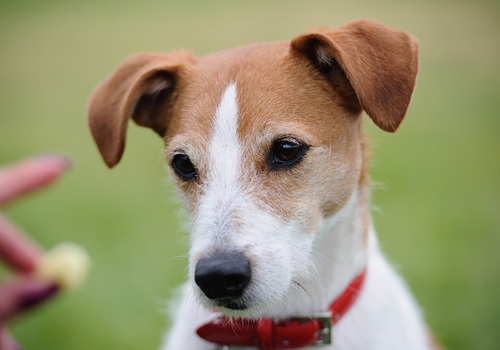No matter the coat type, smooth or broken, weekly brushing will keep the hair neat and clean and will prevent flyaways from landing on furniture or carpet. Only bathe a Parson as needed, which, with regular brushing, shouldn't be very often. The broken coated Parson Russell requires stripping twice a year to maintain the proper coat texture.
Check the ears on a regular basis for signs of wax buildup, irritation or infection. Clean the ears with a cotton ball and a veterinarian-approved cleanser; never use a cotton swab in a dog's ear canal. Teeth should be brushed on a weekly basis to prevent tartar buildup, promote gum health and keep bad breath at bay. Trim nails monthly if the dog does not wear the toenails down naturally outdoors.
Parson Russell Terriers are playful, affectionate, fun-loving companions. They have a great zest for life and are always ready to join in activities.
They are also high-energy terriers with powerful hunting instincts—with their strong prey drive, keeping them on a leash during outings is recommended, rather than letting them run loose, where the urge to go off on a chase may be irresistible.
An ideal day for a pet Parson would include a long walk in the woods, where he could explore every hole and sniff every tree trunk. Exercise can also consist of play sessions in the backyard. A Parson is a dog for someone who is fairly active. He will not be satisfied to lie alone in the corner for long periods of time.
A very small dog means a dog that can easily pack on the pounds in a hurry, so it’s important to feed a dog protein to keep it full. Meat like hard-boiled eggs, poultry, beef, and even lamb all make great additions to their diet, especially incorporated into other ingredients snuck in for nutrition’s sake.
The Parson Russell Terrier should do well on high-quality dog food, whether commercially manufactured or home-prepared with your veterinarian’s supervision and approval. Any diet should be appropriate to the dog’s age (puppy, adult, or senior).
Some dogs are prone to gettingoverweight, so watch your dog’s calorie consumption and weight level.Treatscan be an important aid in training, but giving too many can cause obesity. Learn about whichhuman foodsare safe for dogs, and which are not. Check with your vet if you have any concerns about your dog’s weight or diet.Clean, fresh water should be available at all times.
The average life span of the Parson Russell Terrier is 13 to 15 years. Breed health concerns may includecataracts, cerebellar ataxia,congenital deafness,Legg-Calve-Perthes disease, lens luxation, myasthenia gravis, patellar luxation andvon Willebrand disease.
Generally considered confident and strong-willed, the Parson Russell Terrier will be receptive to training if you can demonstrate patient and effective leadership.
It’s not difficult, however, to let the Parson Russell Terrier get under your skin and eventually find a way to win dominance over you, so be sure that you understand the principles of leadership before starting your dog on a training regimen.
Rules and limitations will be important for the Parson Russell Terrier so that it understands it does not have permission to go everywhere in your home as you do.













